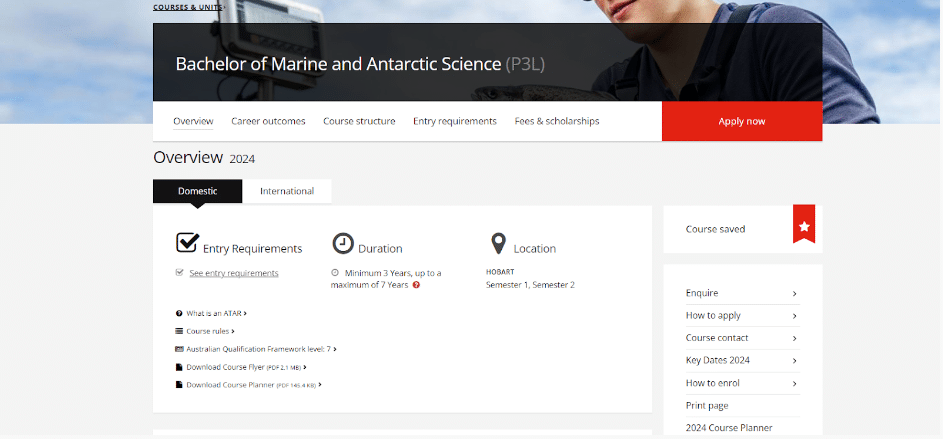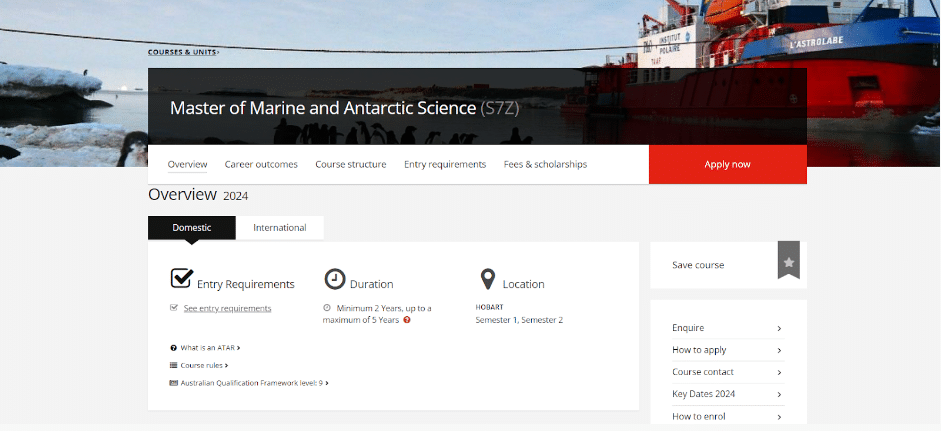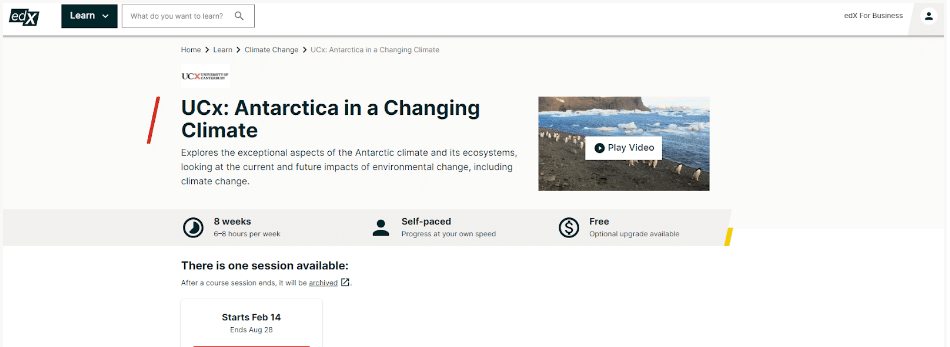Ever dreamed of unlocking the secrets of the ocean depths or exploring the icy wonders of Antarctica?
A Marine and Antarctic Science (MAS) course could be your passport to adventure! Delving deeper than just beachside fun, MAS programs offer a rigorous dive into the intricacies of our planet’s oceans and the unique ecosystem at its southernmost tip.
But what if traditional university paths aren’t your cup of tea? Fear not, intrepid explorer!
This article charts a course through the diverse landscape of MAS opportunities, revealing exciting alternatives for those seeking to connect with the ocean in all its forms.
Marine And Antarctic Science
This course is designed to explore the fascinating worlds of marine and Antarctic science, focusing on the life, ecosystems, and environmental challenges of the ocean and the Antarctic region.
Ideal for students, environmental enthusiasts, and anyone curious about marine biology and polar science, this course covers a wide range of topics from oceanography and marine ecology to the study of Antarctic climates and wildlife.
Through simple explanations, captivating examples, and interactive discussions, participants will gain insights into the importance of these ecosystems and the need for their conservation.
Course Syllabus Preview
Our course syllabus is structured to ensure a comprehensive understanding of marine and Antarctic science, making it accessible and engaging for all learners. Here’s an overview of the major topics and their subtopics:
I. Introduction To Marine Science
- The Ocean’s Role in Earth’s Systems
- Major Ocean Habitats and Zones
- Marine Biodiversity and Conservation
II. Oceanography
- Physical Oceanography: Currents, Waves, and Tides
- Chemical Oceanography: Salinity, Nutrients, and Ocean Acidification
- Geological Oceanography: Seafloor Features and Processes
III. Marine Ecology And Organisms
- Marine Ecosystems: Coral Reefs, Mangroves, and Deep Sea
- Adaptations of Marine Life
- Human Impacts on Marine Ecosystems
IV. Introduction To Antarctic Science
- Antarctic Geography and Climate
- Antarctic Wildlife and Ecosystems
- Research and Exploration in Antarctica
V. Climate Change And Polar Regions
- Effects of Climate Change on Oceans and Marine Life
- Melting Ice and Rising Sea Levels
- Conservation Efforts in Marine and Antarctic Environments
VI. Sustainable Management Of Marine And Antarctic Resources
- Fisheries Management and Marine Protected Areas
- Antarctic Treaty System and Environmental Protection
- The Future of Marine and Antarctic Science
What You Will Learn
By joining this course, participants will gain:
- Foundational Knowledge: Understand the basic principles of marine and Antarctic science, including the physical, chemical, and biological aspects.
- Environmental Awareness: Learn about the environmental challenges facing the ocean and Antarctic regions and the importance of their ecosystems.
- Conservation Strategies: Gain insights into conservation efforts and sustainable management practices for marine and Antarctic environments.
- Scientific Exploration: Discover the methods and technologies used in marine and Antarctic research and exploration.
- Global Impact: Understand the global significance of marine and Antarctic science in addressing climate change and protecting biodiversity.
This Course Includes
- 15 Hours of On-Demand Video: Detailed video lectures that provide in-depth coverage of marine and Antarctic science topics.
- 6 Comprehensive Articles: Supplementary reading materials to enhance your understanding of the subject.
- 10 Downloadable Resources: Access to additional information, guides, and tools to support your learning.
- Mobile and TV Access: Study from anywhere, anytime, with lessons available on both mobile and TV.
- Certificate of Completion: Showcase your commitment to learning and your newfound knowledge in marine and Antarctic science.
3 Best Courses On The Marine And Antarctic Science
Here are some alternatives to online Marine and Antarctic Science courses:
1. Bachelor Of Marine And Antarctic Science: University Of Tasmania

| Course Link | Here |
| Pricing | Varies |
This is a comprehensive undergraduate program focusing on marine and Antarctic science.
– What does it offer?
The program provides specialized skills and knowledge in marine and Antarctic science, with options for different majors such as marine biology, oceanography, and sustainable aquaculture.
– What will I learn?
Students will gain skills in data collection, analysis, and presentation to interpret marine processes and patterns.
– Where could this lead me?
Graduates can pursue careers as marine biologists or oceanographers or work in marine resource management.
2. Master Of Marine And Antarctic Science: University Of Tasmania

| Course Link | Here |
| Pricing | Varies |
This is a postgraduate program offering specialized streams for in-depth learning in marine science.
– What does it offer?
The program provides practical skills alongside theoretical studies, research links, and industry experience.
– What will I learn?
Students will gain skills in research methodology, scientific methods, and critical analysis in the field of marine and Antarctic science.
– Where could this lead me?
Graduates can pursue meaningful scientific careers in industry or as researchers, with opportunities in marine biology, fisheries management, or sustainable aquaculture.
3. Antarctic In A Challenging Climate: EdX

| Course Link | Here |
| Pricing | Free |
EdX offers a variety of online courses in marine and Antarctic science from top universities and institutions.
– What does it offer?
The course covers topics such as marine biodiversity, climate change, and polar ecosystems.
– What will I learn?
Learners will gain knowledge about the unique ecosystems of the marine and Antarctic environments and the challenges they face.
– Where could this lead me?
These courses can provide a strong foundation for a career in marine research, environmental policy, or conservation.
Conclusion: Learn About The Marine & Antarctic Lives
Whether you envision yourself as a research scientist studying kelp forests or a citizen scientist monitoring coastal ecosystems, the path to ocean exploration is vast and varied.
Don’t let traditional MAS programs limit your journey. Consider online courses, citizen science initiatives, or hands-on field experiences for a more flexible approach.
Remember, the key is a burning curiosity and a desire to protect this vital element of our planet.
So, dive into the options presented, chart your own unique course, and prepare to make a splash in the world of Marine and Antarctic Science!
Article By

